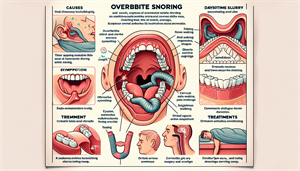
About Mouth Exercises for Snoring Relief
Seeking relief from disruptive snoring? Look no further. This article unveils scientifically-backed mouth exercises for snoring, offering a structured guide to strengthen the key muscles that can silence the snores. These easy-to-follow exercises are designed for practicality and efficiency, paving the way to quieter, more restful nights without relying on invasive treatments. Get ready to tackle snoring head-on with our methodical approach.
Key Takeaways
Mouth exercises can help reduce snoring by strengthening facial and throat muscles, thus increasing airway muscle tone and decreasing the risk of tissue vibration that causes snoring. Snoring can be a symptom of more serious health issues such as obstructive sleep apnea, and while mouth exercises offer benefits, they are not a comprehensive treatment for sleep apnea. Consistent practice of mouth exercises, alongside lifestyle changes such as weight loss and improved sleep hygiene, can enhance the effectiveness of these exercises in reducing snoring.
Understanding Snoring: Causes and Effects
Snoring is more than just an annoying distraction during the night. It’s a sign that air isn’t flowing freely through your respiratory tract, causing the surrounding tissues to vibrate and produce that all-too-familiar sound. Affecting a significant portion of the population, snoring can be a symptom of other health problems, such as: obstructive sleep apnea, nasal congestion, obesity, alcohol consumption, and smoking. If you or your partner snore regularly and it is affecting your quality of sleep, it may be worth seeking medical advice to determine the underlying cause and explore potential treatment options.
However, there’s a ray of hope: mouth exercises can help tone the facial and throat muscles around your airway, similar to how you would work out any other muscles in your body. Concentrating on fortifying your tongue, lips, jaw, and cheeks can decrease snoring and even enhance your sleep quality.
The role of muscle tone in snoring
The root cause of snoring often lies in our muscle tone. As we sleep, the muscles in our mouth, throat, and tongue relax. This relaxation can lead to loose tissue in the upper airway that vibrates as we breathe, resulting in that thunderous snore. Factors such as certain medications, alcohol consumption before bed, and natural declines in muscle tone associated with aging can contribute to this issue. The physiological effects of this poor muscle tone can include a reduction in airway diameter, decreased blood oxygen levels, and difficulty concentrating. Fortunately, exercises such as the tongue stretch can bolster these muscles, leading to a reduction in snoring.
Sleep apnea and snoring
Snoring can often be a sign of a more serious condition, snoring and sleep apnea, specifically obstructive sleep apnea (OSA). This condition is characterized by: floppy muscles in the back of the throat that relax to the point of nearly or completely closing off the airway, disrupted sleep, and reduced oxygen levels during sleep. If you suspect that you or someone you know may have OSA, it is important to consult with a healthcare professional for diagnosis and treatment.
Symptoms of moderate obstructive sleep apnea typically include: daytime sleepiness, frequent awakenings during the night, morning headaches, and being disrupted by sounds of snoring, choking, or gasping for a deep breath. If you encounter these symptoms, seeking advice from a healthcare professional is imperative. While mouth and throat exercises can provide some relief for snoring associated with OSA, they are not considered an effective treatment for the condition.
The Science Behind Mouth Exercises for Snoring
You might be thinking, “Can strengthening my mouth and throat muscles really help me stop snoring?” The answer is a resounding yes! Mouth exercises have been scientifically proven to enhance the strength and tone of the muscles in the mouth and throat, leading to a reduction in snoring. These exercises target specific muscle groups, such as the tongue, lips, and jaw, to improve airway muscle tone and decrease the risk of tissue vibration that causes snoring.
Consistent practice of these exercises, alongside lifestyle changes such as weight loss and improved sleep hygiene, can significantly reduce snoring and improve sleep quality.


